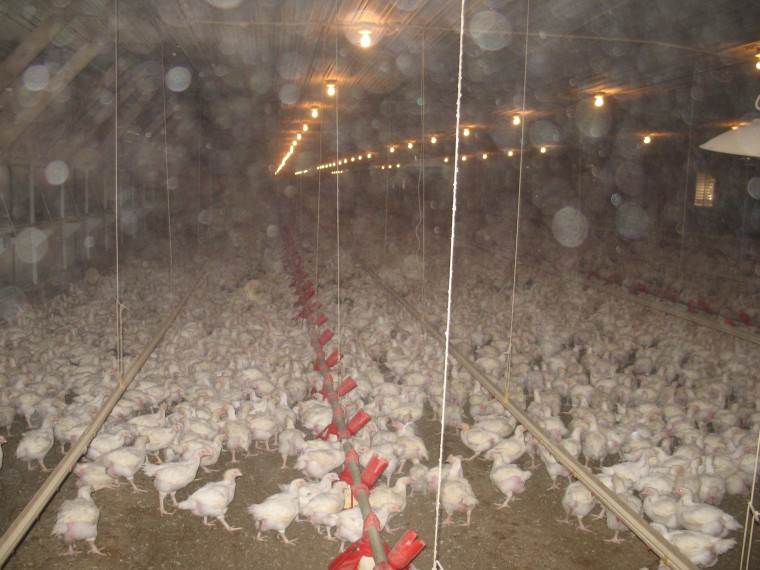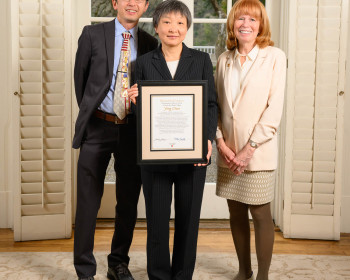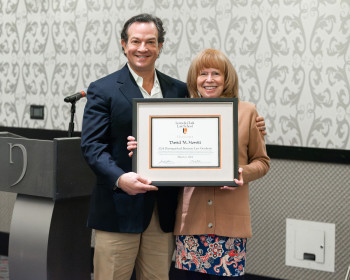Earthrise Receives Precedent-Setting Ruling
Open gallery

Food & Water Watch
Food & Water Watch
In September, Earthrise Law Center, Lewis & Clark Law School’s environmental litigation clinic, received an important ruling from Chief Judge Beryl Howell of the D.C. District Court in a case which sought to require the U.S. Department of Agriculture to more closely regulate the adverse environmental impacts of Confined Animal Feeding Operations (CAFO’s).
Law student Teresa Smith ’19 helped draft several sections of the D.C. case briefing, Tarah Heinzen ’09 was the co-counsel on the case, and Earthrise’s new legal fellow, Morgan Staric ’18, helped draft the complaint in the case when she was a law student.
“It is very exciting to have had the opportunity to work on a case that set such great precedent,” said Smith. “I am very passionate about factory farming and CAFOs, so this was a case that I knew I wanted to work on from day one at the Earthrise clinic.”
A CAFO is an animal feeding operation that confines thousands of animals, and in the case of chickens hundreds of thousands, in tight, sometimes immobilizing spaces, for the animal’s entire life. Claiming economic efficiency, these so-called “factory farms” have completely transformed the way meat and dairy are produced in America.
The unregulated negative externalities of CAFOs are extensive. The concentrated waste produced by the chickens, turkeys, cattle, and pigs subject to this system create large sources of air and water pollution, and raise ethical concerns about inhumane animal treatment.
Several programs administered by the USDA provide loans or loan guarantees to pay for the construction and operation of CAFOs. These programs have significantly contributed to the proliferation of CAFOs in several states, including Maryland. “The funding of these loans is a ‘federal action,’ which triggers the USDA’s obligations under the National Environmental Policy Act (NEPA), meaning the USDA must prepare public Environmental Assessments or Environmental Impact Statements before it funds these loans,” said Tom Buchele, Earthrise co-director and clinical professor of law.
In 2013 Earthrise, working with EarthJustice attorneys, filed a lawsuit in Arkansas on behalf of several clients, including The National Parks Conservation Association. They challenged the legal sufficiency of the USDA’s Environmental Assessment for a loan guarantee that funded the construction of a hog CAFO very close to the Buffalo River, which has a legal protection status equivalent to a national park. The Arkansas District Court upheld the National Environmental Policy Act (NEPA) claims, and the ruling resulted in the USDA imposing more stringent environmental mitigation requirements on the hog CAFO.
Last year, Earthrise filed a lawsuit in D.C., on behalf of its client Food & Water Watch, challenging USDA’s Environmental Assessment for its loan guarantee regarding a chicken CAFO in Maryland. In this case, the U.S. Department of Justice (DOJ) more aggressively challenged Food & Water Watch’s standing, argued that the case was moot because the CAFO had already been built, and refused to submit many documents to the administrative record.
Judge Howell issued a strong opinion, rejecting all of the DOJ’s arguments. She held that the case was not moot, that Food & Water Watch had standing, and ordered the USDA to add many more documents to the record. Earthrise will now move forward on the merits.
“The ruling is an important precedent in terms of the standing of environmental groups to bring these legal challenges and several other, similar lawsuits are being developed,” said Buchele.
Earthrise Senior Staff Attorney Kevin Cassidy handled the Arkansas case for Earthrise and is lead counsel for the D.C. case.
Earthrise Law Center maximizes its impact through the work of talented and committed law students. While Earthrise’s staff attorneys retain ultimate responsibility for case prosecution, students play a vital role at Earthrise by participating in all phases of the clinic’s work. Students draft pleadings and motions, formulate arguments and strategy, and participate in meetings and calls with client.
In addition to receiving invaluable hands-on experience, students earn law school credit for their work with Earthrise. The environmental clinic class supplements student casework by providing additional instruction on the practice of environmental law.
Law Communications is located in room 304 of Legal Research Center (LRC) on the law Campus.
MSC: 51
email jasbury@lclark.edu
voice 503-768-6605
Cell: 626-676-7923
Assistant Dean,
Communications and External Relations, Law School
Judy Asbury
Law Communications
Lewis & Clark Law School
10101 S. Terwilliger Boulevard MSC 51
Portland OR 97219

